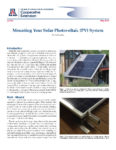The educational materials listed on this page are about Renewable Energy.
Renewable energy can address critical resource needs in agriculture as well as the challenges of climate change, which can impact agriculture in many ways. Farm energy production can contribute to overall economic viability of farms. Therefore, thinking about alternative sources, such as solar energy, geothermal energy and wind energy, is important to farm economics and sustainable practices. Using solar power, a farmer can boost on-farm energy production without dramatically raising costs. Green energy, also known as clean energy, is a viable option for combating climate change. Investing in this kind of sustainable energy on your farm operation could prove beneficial to farm finances. Geothermal power and wind power are both clean power options worth considering if a financially sound and sustainably managed farm is the end goal. Key practices include energy conservation/efficiency, energy use and consumption, byproduct utilization, renewable energy, solar energy, wind power, geothermal.
Clean Energy Farming: Cutting Costs, Improving Efficiencies, Harnessing Renewables is a bulletin SARE offers that can help farmers turn to clean energy practices on their operations, whether large or small. This will help farmers learn ways to implement farming practices that save energy, protect natural resources, and produce and use renewable fuels. For farmers who want to better understand the role of sustainable management of water in a farm system, including geothermal, check out Smart Water Use on your Farm or Ranch. SARE’s book Building a Sustainable Business aids producers in building both a sustainable and profitable business plan for their new enterprise that includes renewable energy options. The Farm Energy Topic Room provides a wealth of information on clean energy topics, including biodiesel, farm energy audits, solar and wind energy, and more.
Showing 1-1 of 1 results

Solar Energy Training Program
Fact sheets/bulletins on the fundamentals of solar photovoltaic energy systems.